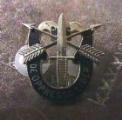I always get frustrated by supposedly well-informed people criticizing "patronage" systems.
Having spent 25 years in and around government at every level, you would have to be on drugs to not understand that patronage and preference are key drivers of almost all political processes.
The balance to keep these things in check are, among other things, transparent budget and financial reporting processes, management and performance metrics, ethics and contract guidelines, and, when all else fails, an FBI investigation. Did I say I am from Maryland?
In Iraq, a tremendous amount of fraud, waste and abuse was ours (US), and not Iraqis. (SIGAR always reports its big busts, and plenty of sources for the rest).
Effective management and performance controls are, in the best light, ideals, but, in the course of decision-making, political and budget trade-offs, and implementation, there is often a "slip twixt the cup and the lip," and that's without a backdrop of war, corruption, and lost in translation.
Under those conditions, any complex and challenging programs, projects, and tactics are running hard against any credible probability of successful implementation. Bottom Line: Lucky if anything works out.
Constant management focus, once a program gets underway, is disaster avoidance (from many sources), and afterwards, whether success is possible.
These are embedded realities underscoring any credible assessments in Afghanistan (policing, anti-corruption, extension of services, etc...), and really unaffected by changes in personalities (Karzai, for example).
Sorry, Bob, but strategies that do not factor in these essential system parameters are just pipe dreams.
This stuff is just plain hard.












Bookmarks